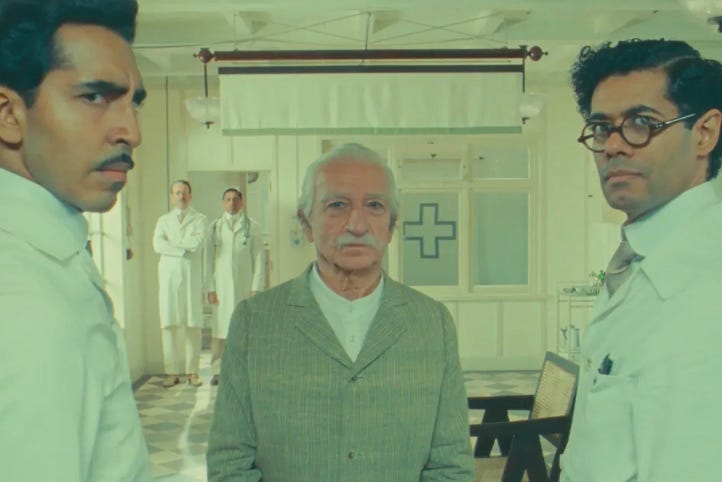Shorts, or short films, which are defined as films whose run times are 40 minutes or less, often fuel more creativity in the cinematic art form and inspire deeper reflection than longer format films. This can be a factor of budget, of production challenges and simply the long road to executing on an idea weeding out the lesser films. The process forces the filmmaker to be very intentional about the final product and through it, as viewers we are then exposed to newer, more independent-spirited filmmakers. Despite all the positive, I’ve often felt of shorts, much like with poetry and quinoa, that it leaves me with an uncomfortable aftertaste and still hungry, filled with furious questions that have no resolution and present multiple interpretations of what I just saw, or ate.
I want one right answer damnit - not ambiguity. And I want real starch, like fries.
In his acceptance speech for “Best Adapted Screenplay” for his film American Fiction, Cord Jefferson, a relative newcomer to Hollywood, reflected on the trend in the film industry towards big budget blockbusters, like “Barbenheimer(s)” and his viral words are reverberating in more than the echo chambers of the Academy of Motion Picture Arts & Sciences:
“It’s a plea to acknowledge and recognize that there are so many people out there who want the opportunity that I was given. I understand that this is a risk-adverse industry, but $200 million movies are also a risk. But you take the risk anyway. Instead of making one $200 million movie, make twenty $10 million movies or fifty $4 million movies.”
Quick mental math lesson aside (I would have stopped at 20 for fear my divisor of 50 skills were not up to snuff in front of such a large audience), Jefferson is touching on perhaps the reason that I’m gravitating to the shorts and others, too. There’s more compelling thought exploration, creativity in animation or live action cinematography and more diverse voices out there saying interesting things. It all feels more “of the people” but “of the really, smart, talented, persistent, even well-connected people” variety. And I’m not talking TikTok or YouTube Shorts, though the trend towards consumption of shorter-form videos is at peak with Gen Zers and Millennials, which has to create a ripple effect here.
The argument being, support the short film format. Go out and watch them. Let it be our humble protest against the 3.5 hour long blockbuster mammoth. Please stop making obnoxiously long films [that coincidentally involve at least 2 start/stops just to appease my bladder]
Letter to a Pig
Filmmaker Tal Kantor created the Oscar nominated Short Letter to a Pig, now playing on Vimeo (for $3.99). Seriously, rent it. It’s less than the $5 you paid for the romantic shlock (albeit, really good shlock), on Prime to watch super two attractive actors get into their skivvies star in Anyone But You. And to be clear, I would see this film again. And also to be very clear, maybe it’s just me that paid for it.
In Letter to a Pig, the 18-min. animated short, an aging Holocaust survivor comes to speak to a class on Yom Hashoah, the yearly memorial for the Holocaust that takes place in Israel. In his account, in his thick Polish accent, he tells the class about his youth and speaks of the vengeance he seeks for those that perpetrated the crimes against the Jewish people, the dehumanization he experienced, and poignantly reads aloud a letter he has written to a pig, thanking the pig for not judging him or giving him up.
A letter to a pig, of all things. But why?
During the Holocaust, the man, who was a boy at the time, hid in a pigpen for many days and weeks. He recalls the cold, but his survival was predicated on the pigs - their presence hid him. As the story takes flight, one of the children listening in the class, a girl, starts to imagine the story from her perspective and that of her classmates taking part in the reimagining. The pig is a divisive animal in Jewish culture. We don’t eat pigs. They aren’t kosher and we know them to be dirty and malodorous and yet, here is a child, forced to reckon with a creature whose existence is antithetical to his religion and here is the animal protecting him from a crueler fate.
Certainly this irony can bring up many topics for discussion, but the path to the pig’s perversion in the latter half of the film distorts the view. The kids, no longer innocent, take part in something less than idealistic (no spoilers, here) but then hope is restored at the end. It’s a cautionary tale of the effects of trauma and one that says more about those who inherit those dark emotions, second hand - the benefactors of their grandparents’ (if you’re of certain age) or great grandparents’ pain and loss at the hands of those who hated them just for existing.
In The Zone of Interest, a perpetrator fiction film that won an Oscar, filmmaker Jonathan Glazer goes into painstaking detail etching out the sounds heard and the goings-on in his dramatization of the real life Hoss family, a Nazi family who lived next door to Auschwitz. In his acceptance speech for “Best International Feature,” Glazer likens his film’s message of broad-scaled dehumanization with the very specific situation in Gaza. What I found particularly troubling was his lack of calling out that specific grain of evil that has been spat at the Jewish people since the first rumblings of blood libel in the Middle Ages or using his platform to stick to the subject matter at hand (in the film), the one he clearly has studied and can speak to. Instead, he spoke of refuting a certain form of his Jewishness (questionably anti-semitic) which he believes to be distorted, but all that will be heard in the end is his refuting his perceived identity - maybe not the one he chooses to be identified with but the one others will identify him as. Also, the film bored me. I wanted to like it.
Footnote
On Oscar night, instead of watching in anticipation and excitement, I found myself holding my breath. The Oscars were delayed due to a pro-Palestinian protest. After which, I debated watching the Oscars altogether, but decided to watch because I always watch this ceremony. I review films! I love this stuff, only right now, it doesn’t feel as safe to be a Jew. I sat on my couch eating (not quinoa) and hoping that the winner [of any one award] didn’t use their win to attack Israel in front of an unsuspecting audience who would then take this as the ok to perpetuate more hate onto Jews. I found myself praying there wouldn’t be any jokes at Jewish peoples’ expense like in past years and at other awards. And in the end, I got angry at Oppenheimer, also a Jew btw, but not at the person, angry at the film, for winning too many awards, because I had to place my anger somewhere, even if it’s misplaced. And because I loved Killers of The Flower Moon more [see my take here]. Besides, it’s better than saying, “Geez Hollywood. Get it together.” Sorry RDJ for rolling my eyes at your win. I really am happy for you, especially now that I know this is your first Oscar.
In Closing (more Shorts stuff)
While it can be a feat to find Shorts streaming online, they do exist, but if you’re looking to hit them up all in one sitting, try a theater near you. Check this site.
Oscar nominated short, The After, currently streaming on Netflix tells the story of a rideshare driver whose life we get to see before and after a tragic event. It’s intense, explosive and beautiful.
The Wonderful Story of Henry Sugar - Won for “Best Live Action Short Film” and here’s hoping that filmmaker Wes Anderson continues to make magic with this format. (My synopsis here (at the bottom)
Now It’s Your Turn
What shorts have you watched in the past 10 years and enjoyed?
Did you see any of the shorts I mentioned yet?
If you saw the Oscars, any highlights for you? Any missed opportunities?
Should Oscars be a place of politics?








Couldn't agree more with everything. Also a great post.